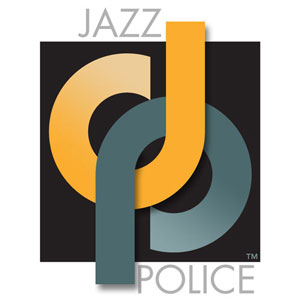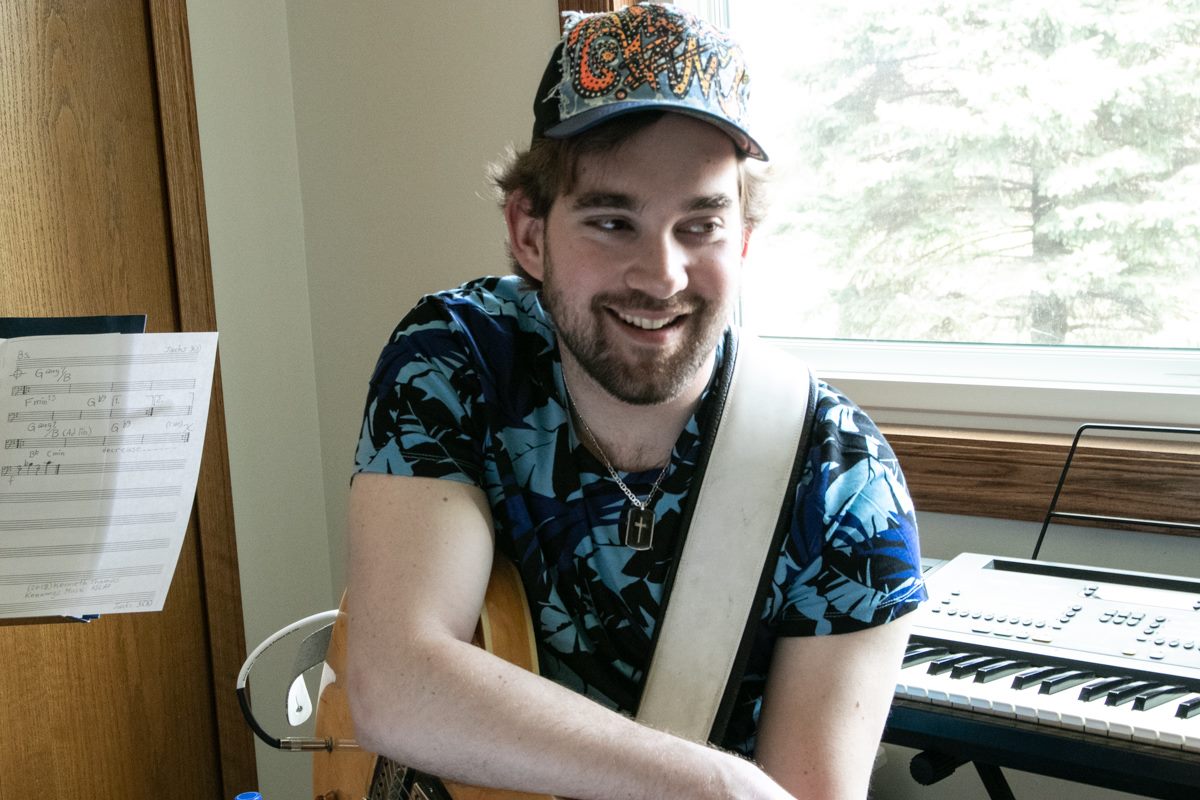Cody Steinmann is a 27 year-old guitarist raised in Milwaukee and based in Minneapolis. Steinmann is a self-made man. He had to work for everything that he’s gained as a jazz guitarist, and he’s not afraid to tell you that. He combines his discipline with the life experiences which shaped him: overcoming struggle, crime, and addiction. Through the power of music, Steinmann aims to transform the dark spots into brilliant corners. We sat down to talk about his life, his debut record, and his take on the Twin Cities music scene.
I listened to your debut record Seven from 2019 and I love it. It’s a Twin Cities record, but it’s also a Milwaukee record.
Nelson Devereaux and I are from Milwaukee. The rest are Twin Cities musicians.
And we get to hear your compositions.
A lot of the content on that record is about my experiences. All the content.
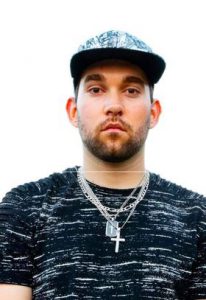
I love Milwaukee. I lived in Baltimore for a couple of years and I’ve always felt that Milwaukee and Baltimore are similar cities: historical, musical, medium-sized, black, gritty, on the water.
I’ve never heard that before, but I can see it. I’ve had friends who’ve moved from Detroit to Milwaukee. Detroit is notorious for being a rough place, for being a place that if you come out of it, you’re a real person, a real motherfucker.
My friends who moved to Milwaukee from other places talk about the similarities. And then there are similarities to Chicago. But what’s beautiful about Milwaukee is that there is a really strong gospel scene, a bunch of great gospel musicians. The black American music going on in Milwaukee is amazing. Also, there is a traditional and super killing bebop scene.
At The Estate, right?
At The Estate and a couple of other venues. The center of the jazz scene is The Estate. It’s a lot more diverse now than it was back in the day. Back in the day it was straight bop. There’s a lot of great guitar players in that town.
Did you grow up watching those guitarists?
Actually, I didn’t. I didn’t get involved in music really at all until I was 18. I didn’t even start being able to go to the clubs until I was 20. It was funny, as a young one I was a drug addict, which is the part of my life that much of the album is about. Seven is about expressing a lot of the stuff that I bottled up for a long time in relation to my family life and growing up in West Allis – a weird part of Milwaukee county between a richer white neighborhood and a southside hood – and my experiences on the streets. Basically, my past experiences with my family and on the streets and at school are expressed on the record. Honestly, I really didn’t get into music until I was 18.
What comes out for me on Seven is a deep hip-hop sound. Was that music a gateway to jazz? How does it fit in?
Actually, my first love ever musically was Michael Jackson. As a young kid I was obsessed with Michael Jackson. I wanted nothing more than to be Michael Jackson. Then as I got older, I had phases with the boy bands: N-Sync, Backstreet Boys.
Hip-hop was always there man: Lil Wayne, Young Jeezy, OutKast, Cypress Hill, DMX, Eminem.
I have an uncle who passed due to a drug overdose. He hipped me to metal music. He got me into bands like Pantera and White Zombie.
What age?
I was probably eight. That stuff had a real big influence on me. As I got older, I got more and more into metal, what some of the genre nazis would call “technical death metal.” I was really into bands like Necrophagist, The Faceless, Nile. I still listen to a good amount of metal.
Interspersed in between all of that, doing drugs, being in Milwaukee, being around a strong black culture, there was a lot of hip-hop.
What else were you listening to?
I was listening to a mix of different stuff. I’ve never been one of those dudes who just sits in one spot. I have tunnel vision about certain things, but for the most part I always keep it diverse. I realized that even if I sometimes hid and pretended that I didn’t like certain musicians because they were mainstream, I always knew deep down that all music is related and there was no way that one genre of music was superior to others, or that one genre of music could express the full spectrum of human emotions. 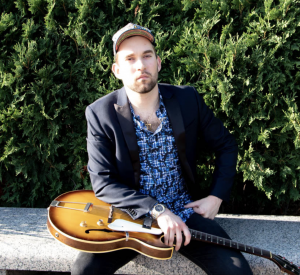
Right on, so you were a metal guitarist with open ears and you found your way into black music?
Yeah, and I wasn’t even really playing guitar at the time. I could only play an Iron Maiden riff, stuff like that. I couldn’t even play a whole song.
So was there a change in there somewhere?
Yes.
Tell me about that.
So, I started getting into the idea of jazz through bands like The Faceless. There was all this stuff among metalheads like “ohhh, they’re jazz-influenced.” I don’t know how much of that is true because I haven’t read any interviews with the artists in those groups. There’s definitely harmonic material that leans toward jazz. There was a group called Animals as Leaders I loved. Tosin Abasi, the lead guitarist and writer for that group is really inspired by Kurt Rosenwinkle and Tigran Hamasyan.
Then I decided to go college for music.
Bold move.
There’s a backstory behind that. I’d always felt drawn to music. I got sober when I was 16. By the time I was 16 years old, I was in alternative school and I had been arrested 8-10 times in one year. I had a bunch of shit on my record, and I was facing charges as an adult. Thankfully, I was able to turn my life around. I worked really hard. At alternative school, they were pushing everybody to go to Milwaukee Area Technical College (MATC). I decided that I wanted to go for music. I either wanted to be a psychologist or a musician. I felt that by doing music I could influence people. I thought I could help people more through music than psychology.
I went to MATC. What’s beautiful is that the guitar teacher who works there also teaches at Lawrence University. At Lawrence University, you’re paying $40,000 a year. When you leave you’re $100,000 in debt. You go to MATC and you spend $2,000 a semester. You’re getting the same education but significantly cheaper.
That program at MATC was started by a guy named Jack Grassel. Jack Grassel passed it on to Steve Peplin. Steve Peplin was like my guru. I got so much out of studying with him. He’s hooked me up with so much and he’s taught me so much. It’s beautiful. I’m forever indebted to him for that.
I didn’t know what I was doing. When I was going to MATC, I had already learned music theory to some extent. I had a basic understanding. I walked into Steve Peplin’s office and I just began to see that these jazz musicians could do anything. I saw the level they were at. They could go anywhere and be comfortable. Steve was a metalhead when he was young, and he made the switch. So, I walked into his office and I said, “I want to be a jazz musician.”
He looked at me and said, “Do you even listen to jazz?” I said, “no.” He said, “Then why do you want to be a jazz musician?” I explained to him, “I see stuff about this music that’s strong and beautiful, and I see where it can take me as a player.”
He was probably like “whatever.” But, he gave me a record. He gave me John Coltrane’s Live at the Village Vanguard: The Master Takes. That was the first jazz record I ever sat down and listened to. And it really just changed my life man. That first song “Spiritual,” Eric Dolphy on bass clarinet. Beautiful.
Were you immediately like “I gotta get a hollow body guitar”?
Not quite yet (laughs). Another thing about Steve is that he’s a hardcore practicer, man. Plus, there’s a lot of badass guitar players in Milwaukee. A lot of them start really young, so I knew that I had a lot of ground to make up. Basically, the next three or four years of my life were just spent digging into the tradition, the bebop tradition. I was learning bebop heads. I was learning bebop language, and bebop tunes.
So you really started practicing around this time?
Age 18 I started really listening to jazz. The summer between age 18 and 19, my playstation broke, I destroyed a computer, and I just had nothing to do. I was like, “Here’s this thing I’ve been wanting to do for so long; and I’ve been, in a sense, running away from it. So, I’m just gonna go hard.”
That summer I decided that I was going to practice as much as I could every day. Basically, my life became this thing where I was practicing 6-8 hours a day for months. Even into the school year, I was going hard.
What were those practice sessions like once you’d been ignited?
It wasn’t on the level of practicing that I’m doing now. But I had these goals: I gotta learn Donna Lee, I gotta learn Bird’s solo on Donna Lee. I’m gonna learn the Donna Lee head in all 12 keys. That’s the kind of stuff I did. I said to myself, “Ok, I’m gonna learn these 50 tunes.”
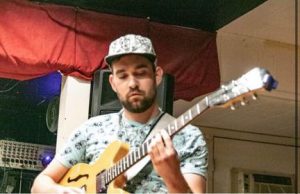
And then the language, man. I would spend tons of time learning licks. And then listening, man. I was listening to lots of Grant Green, John Coltrane, Wayne Shorter. Those are my favorites. Of course I was listening to Bird, too, the bebop thing. That was kind of like my diet.
And you loved it?
I loved it so much, man. It was something that I really wanted. I just went in, and I worked really hard to make it happen.
Ok, you have this moment of inspiration in Milwaukee as a 19 year old and you start shedding for real. When do you move to the Twin Cities and what causes that?
I moved to the Twin Cities when I was 23 turning 24. I had already had some success in Milwaukee. I played the Jazz Estate at 21. It’s tough to get a steady gig in Milwaukee. During that time I met two mentors who opened a lot of doors. I met a gentleman by the name of Jesse Catalino Montijo. He’s directly connected to the lineage of Pharaoh Sanders. His godfather was Jimmy Hopps, who played drums in Pharaoh Sanders band. The second person I met who opened a lot of doors and hooked me up with a lot of knowledge was a world-class trumpet player named Russ Johnson.
After I finished at MATC, I did two years at UW-Parkside for a bachelor’s degree in Jazz Performance. I won their highest scholarship for musicians. Russ was the head of the jazz program there. Through him I was able to get lessons with Ari Hoenig, Pete McCann, and attend master classes with Hamid Drake and William Parker.
At the time, I was in a relationship that was falling apart. I was in a dark place. I was friends with Nelson Devereaux and we had a band. I knew the Twin Cities scene. I was into it. Milwaukee doesn’t have a big original music scene. In the Twin Cities there are significantly more opportunities to play original music and styles other than straight ahead jazz. I decided I really liked the scene here. I knew Nelson, Miguel Hurtado, Joe Strachan, Ted Olson. I’m really glad I made the move.
What’s your impression of the scene here today?
There’s lot of opportunities here. There’s a lot of world-class players here. I felt when I moved here that I needed to step up my game. I’ve worked very hard since I got here. One of the things that’s hard about being in Minnesota – and I didn’t notice it probably because I am a white dude – but it’s really white here. There’s not a lot of the roots. From what I’ve heard, there used to be more of that going on. There’s definitely some really strong players here and players who’ve created certain scenes. But, there’s not really a strong black culture like the one that started things in Milwaukee, for example.
What do you think about how the jazz community responded to the George Floyd protests, and this newly charged racial division in our city?
It’s a hard thing to talk about. As a white person, especially as a white male, I don’t feel I should be the voice speaking about racism in this city or solutions to the problem. That’s something where we should put people of color at the forefront.
I feel that racism is a white problem. It’s not a black problem. It’s a white problem. It’s a problem with things that are programmed into white people.
Now, how do I feel about jazz musicians’ response to George Floyd? Was there a response? There’ve been people who talked about it. There’ve been people who made Facebook posts about it. But, I don’t think there’s been much of a response.
When I talk about roots, when I talk about having a strong black culture, here’s what irritates me: there’s a lot of gatekeepers here, just like in every other city. No matter what city you go to you’re gonna find this problem of gatekeepers and cliques of musicians who are getting all the gigs at a certain venue. In a sense, I understand. These people worked hard, they are great players, they deserve their work. But, having a monopoly over something like that, and not letting other people in, and not giving other people those opportunities, doesn’t allow people to grow and doesn’t allow the scene to grow.
What I see here is a lot of the same people doing the same stuff with the same groups of people. I see a lot of people just booking the same cats and calling it a different band. What I would love to see is more camaraderie. What I would love to see is more of the amazing black artists here – Kevin Washington, LA Buckner, Solomon Parham, Jeff Bailey, Omar Abdulkarim – getting some of these gigs at those places.
There’s a lot of really strong players. What I feel personally is that because I’m a little more ratchet than some white people here, I’ve been sidelined. I feel that because I’ve had real struggles, because I’ve had real problems, people don’t respond to my music the same way. My record Seven is very emotional, deep and about some real shit.
As a response, I would love to see the people here be more conscious of people that aren’t like them. White people being conscious of black and white people who aren’t like them. And giving other people a space to say something. Players who have power, who have a group of cats, why don’t they, at least once a month, have people of color on the bill? Or at least somebody who is not in their clique.
Here’s the thing, there’s a lot of strong players who aren’t getting those opportunities. The problem is when these strong players who are outside the scene aren’t offered these opportunities, there’s no way for them to get to the level of the gatekeepers. They can’t take advantage of those forefront, world-class opportunities.
Tell me a little bit more about your debut record Seven. Obviously it’s allegorically entwined with Christian themes. Each track title is a different deadly sin and there are seven tracks. It’s also autobiographical. But more importantly than all that, you made a great record. Tell me about playing with that band, your compositional process, or anything else that’s behind the record.
That record is a crazy story, man. When I moved here I didn’t realize how fucked up my upbringing was, and what I dealt with. When you get up here you see a lot of families, a lot of wholesomeness, the Minnesota nice thing, and I didn’t know how to navigate any of that. The process of making that record, after I had written all the compositions, I had a full on psychotic break. I had to be hospitalized. I was smoking too much. I wasn’t sleeping. I had a bunch of bottled up stuff that I was expressing on the record that I had never expressed in a therapeutic setting. It all came to a point. I had a breakdown, and I was in psychosis for two or three weeks. It was crazy because after I got out, I came back, and I was still coming down, still readjusting to reality, and in the middle of all that, here I am in the studio recording Seven. I was feeling all that.
That record was me putting all my stuff together: everything that influenced me, everything that’s a part of me, me and my totality being like, “You know what? I’m just gonna make something. I’m not gonna try to put this in some sort of box. I’m not gonna try to put this in the jazz box. I’m not gonna try to put this in the rock box, or the hip-hop box. I’m just gonna try to make music.”
Right on. You had a concept, brother.
Yes. The concept was the seven deadly sins. Each track is titled with a sin. It’s about my run-ins with the seven deadly sins and how I’ve grown. There will be a follow-up record about having gotten out of that.
Finally, what are your aspirations for 2021?
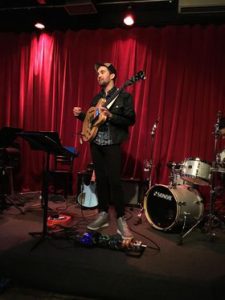 Man, I hope to just continue to love people to the best of my ability, and continue to grow as a person and a musician. I hope to continue to inspire other people to do the best they can with their own life. I don’t want to say too much, but there’s some stuff in the works with my group the Sightless Quartet. And I do have some other musical adventures that’ll be on the way.
Man, I hope to just continue to love people to the best of my ability, and continue to grow as a person and a musician. I hope to continue to inspire other people to do the best they can with their own life. I don’t want to say too much, but there’s some stuff in the works with my group the Sightless Quartet. And I do have some other musical adventures that’ll be on the way.
